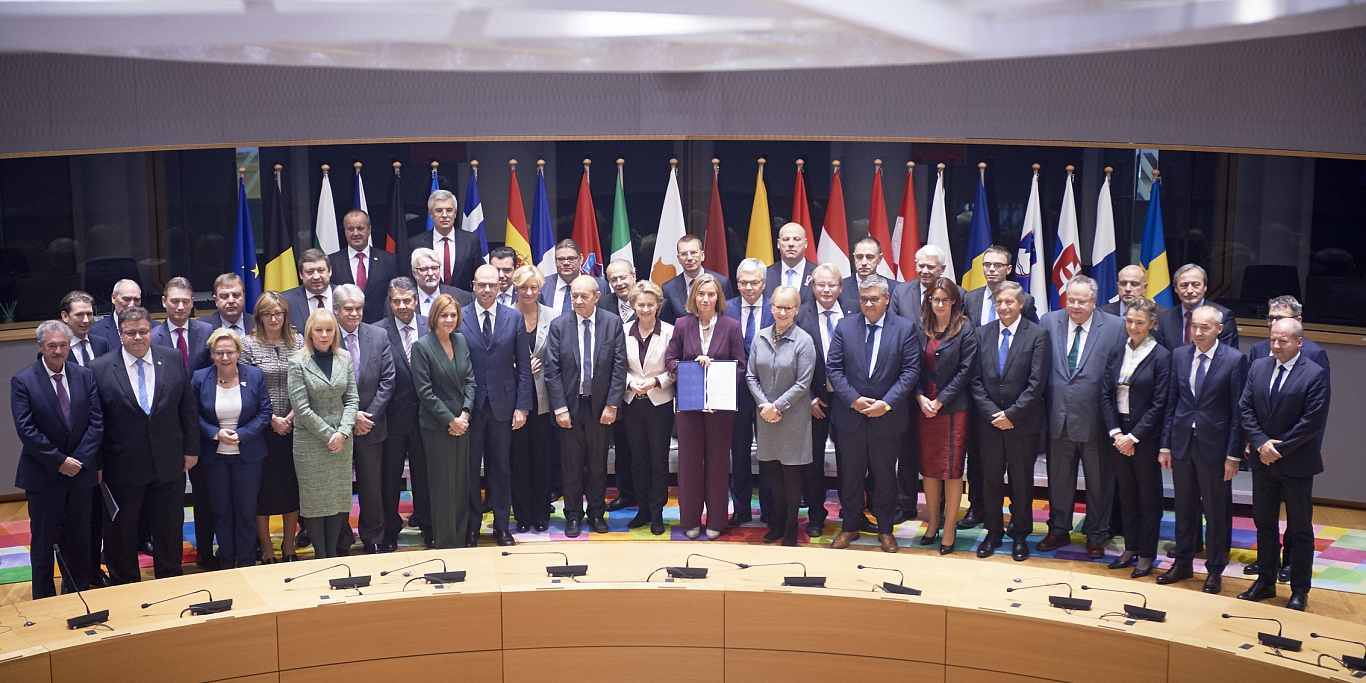At the joint Foreign Affairs and Defense Council of the European Union in Brussels, Latvian Foreign Minister Edgars Rinkēvičs and Defense Minister Raimonds Bergmanis signed an agreement on the establishment of what is termed ''Permanent Structured Cooperation'' (PESCO) on security and defense, seen as a basis for a future European defense union to run parallel with but not overlap with NATO membership.
On behalf of Latvia with Defence Minister @RaimondsBrg signing notification on EU’s Permanent Structured Cooperation (PESCO), it will allow to improve EU’s defense capabilities and resilience against hybrid threats pic.twitter.com/C73QCZ9vLG
— Edgars Rinkēvičs (@edgarsrinkevics) November 13, 2017
"PESCO member states commit to make adequate financial investments in security, such as equipment purchases, to coordinate defense planning in order to address shortages and improve the availability of forces for crisis management outside the EU," a statement from the Ministry of Foreign Affairs said.
"The launch of PESCO is an important step in strengthening the military capabilities of EU Member States. It will complement NATO's capabilities and facilitate practical cooperation between the EU and NATO," the ministry added.
Latvia is particularly interested in participating in a project to accelerate and improve the transfer of military personnel and transport in Europe. Such a project would allow an emergency response to crises on the EU's external borders by moving troops, including NATO forces, from country to country rapidly without having to stop for border formalities - something like a military Schengen zone.
Historic moment in #EUDefence: 23 member states to work more closely together on security and defence.https://t.co/oLF6QgIhSj pic.twitter.com/XoylkgZTJ5
— EU Council Press (@EUCouncilPress) November 13, 2017
However, not all EU member states signed up to PESCO. 23 joined the initiative at this stage. The member states who signed the joint notification are: Austria, Belgium, Bulgaria, Czech Republic, Croatia, Cyprus, Estonia, Finland, France, Germany, Greece, Hungary, Italy, Latvia, Lithuania, Luxembourg, the Netherlands, Poland, Romania, Slovakia, Slovenia, Spain and Sweden. It is possible for other member states to join at a later stage.
You can read more about the agreement HERE.
#PESCO in one figure. pic.twitter.com/lbtg4WmRqS
— Valentin Kreilinger (@tineurope) November 13, 2017
Rinkēvičs maintained the security theme in discussions during the Foreign Affairs Council’s discussion on strategic communications, in which he highlighted the need to strengthen the EU’s strategic communication capabilities and develop the existing instruments at the EU’s disposal.
The Foreign Minister called for providing the currently operating strategic communications groups with sustainable and sufficient budgets, and he urged Member States to follow the example of Latvia and send their national strategic communications experts from to work in those groups. Rinkēvičs also expressed support for the reinforcement of independent media and journalism both at the national level and in the Eastern Partnership region.





























